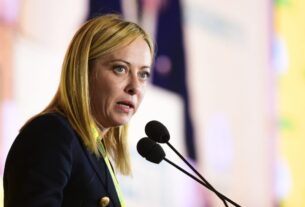NEW YORK — EU foreign policy chief Josep Borrell tamped down expectations of a breakthrough on the Iran nuclear deal at the United Nations General Assembly this week, saying he does not believe a meeting with Iranian President Ebrahim Raisi would be productive.
In an interview with POLITICO on the sidelines of the General Assembly, Borrell said the EU has been pushing all parties “to finally run the last 10 meters” in the process to restore the 2015 nuclear agreement. But he said he did not predict any major progress soon on this issue amid the ongoing EU-led negotiations.
“For the past three months, the interaction, the multistep process was converging. The activity between the parties was improving the result. But in the last weeks, this was not the case. Now we are at a stalemate. Now we are stopped.” Borrell said. “The past proposal, the last request from the Iranian side, was not exactly pushing for an agreement and if we had to say today if something happened this week, I would say ‘I don’t think so.’”
The landmark 2015 deal was negotiated under Barack Obama’s administration in the U.S., along with the other permanent members of the U.N. Security Council — China, France, Russia and the United Kingdom — plus Germany, with facilitation by the EU. It lifted sanctions on Iran in exchange for curbs on its nuclear program. But it hit a roadblock in 2018 when then U.S. President Donald Trump pulled out of the agreement. Behind the scenes, negotiations to revive the Joint Comprehensive Plan of Action (JCPOA), as the deal is officially known, have been taking place sporadically for roughly a year and a half. But a “final text” negotiated by the EU last month has yet to be endorsed by Iran or the U.S.
When asked by POLITICO if he would be prepared to meet Raisi, who is also in New York for the General Assembly, Borrell noted he had traveled to Tehran in June to try to unblock the process: “They promised me, they went to Doha. They went to Vienna.” He added: “I don’t think it’s something that can be solved meeting the president.”
The EU’s Iran point-man, Enrique Mora, is also attending the U.N. General Assembly, while U.S. Secretary of State Antony Blinken too is in New York, though the State Department has played down any possibility of a face-to-face meeting with the Iranian representatives.
Raisi is accompanied by Iranian Foreign Minister Hossein Amir-Abdollahian and nuclear negotiator Ali Bagheri Kani and is expected to hold bilateral meetings on the fringes of the annual gathering.
Privately, other officials are also pessimistic about a breakthrough on the deal before the U.S. midterm elections, given the political sensitivity of the issue, with Republicans, and even members of U.S. President Joe Biden’s Democratic party, skeptical of restoring the deal due to concerns it would be weaker than the original 2015 agreement. Under U.S. legislation, Congress also has 30 days to review any new agreement with Iran.


